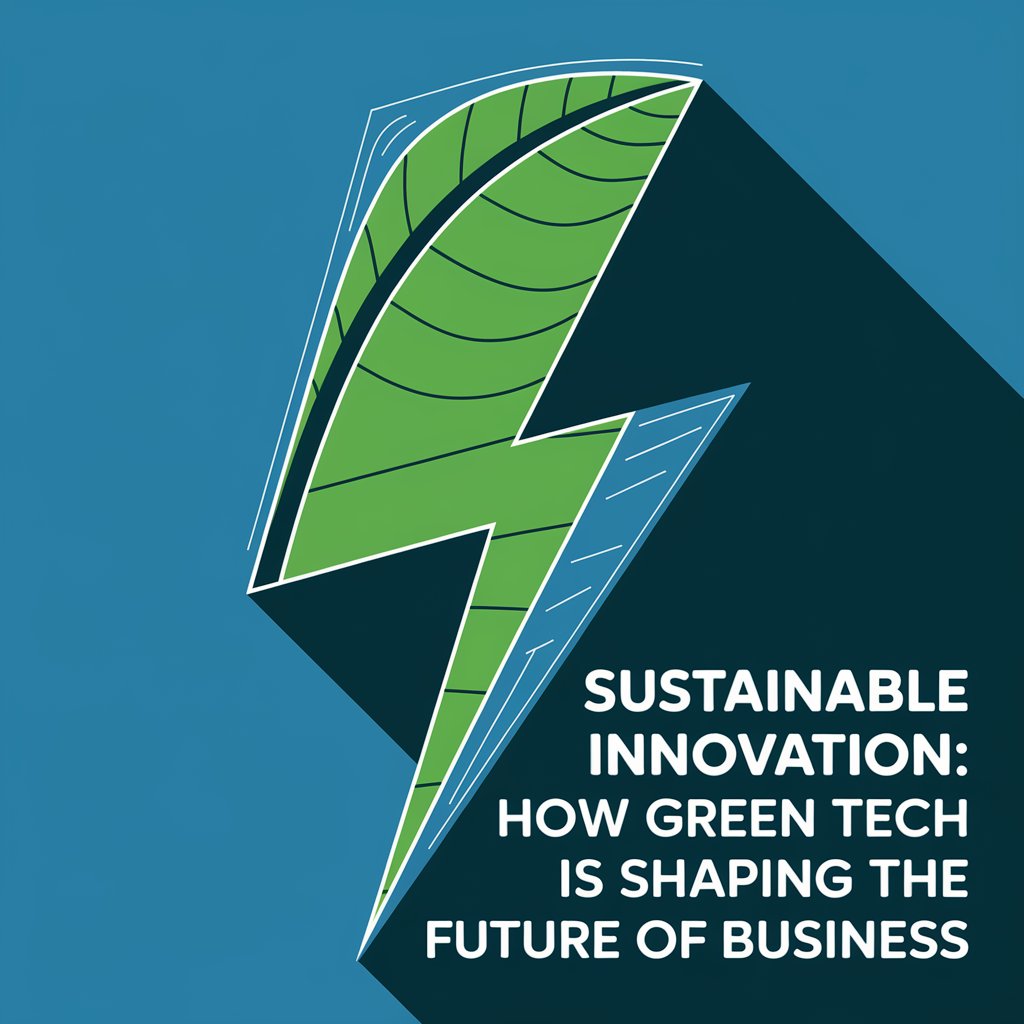Sustainable innovation, driven by green technologies, is becoming the cornerstone of modern business strategies. As concerns about climate change, resource depletion, and environmental degradation continue to grow, businesses are increasingly recognizing the importance of integrating eco-friendly practices into their operations. Green tech—ranging from renewable energy solutions to energy-efficient manufacturing processes—offers a pathway for companies to not only reduce their environmental impact but also gain competitive advantages in a world where consumers and regulators are prioritizing sustainability.
Key Areas of Green Tech Impacting Business
- Renewable Energy Adoption Renewable energy sources like solar, wind, and hydropower are transforming the way businesses power their operations. The cost of renewable energy has decreased significantly, making it a viable alternative to traditional fossil fuels. Many companies are investing in solar panels, wind farms, and energy storage systems to ensure energy security and reduce their carbon footprints.
- Circular Economy Models Green tech is also driving the shift from linear production models, where goods are produced, consumed, and discarded, to circular models, where resources are reused, recycled, and refurbished. This not only reduces waste but also creates new revenue streams through recycling and repurposing materials.
- Energy Efficiency Innovations Technologies such as smart grids, energy-efficient lighting, and building management systems are enabling businesses to optimize their energy consumption. By utilizing real-time data and automation, companies can reduce energy waste, lower operational costs, and enhance their sustainability credentials.
- Sustainable Supply Chain Management Businesses are leveraging green tech to improve the sustainability of their supply chains. From blockchain for traceability to electric and autonomous vehicles for transportation, sustainable supply chains help reduce emissions and ensure that products are ethically and sustainably sourced.
- Green Manufacturing Advanced manufacturing techniques, such as additive manufacturing (3D printing) and biodegradable materials, are helping businesses reduce waste and energy consumption. Green tech is enabling manufacturers to design products with longer lifecycles and lower environmental impacts.
- Carbon Capture and Storage (CCS) CCS technology is becoming an essential tool for companies looking to offset their carbon emissions. This technology captures carbon dioxide from industrial processes and stores it underground, preventing it from being released into the atmosphere.
- Sustainable Agriculture Green technology is playing a key role in transforming agriculture through innovations like precision farming, vertical farming, and genetically modified crops that require fewer resources. These technologies increase productivity while minimizing environmental damage.
Benefits of Green Tech for Businesses
- Cost Savings: Many green technologies, such as energy-efficient systems and waste reduction processes, lower operational costs in the long term.
- Brand Reputation: Businesses that embrace sustainability enhance their brand image and appeal to environmentally conscious consumers.
- Compliance with Regulations: Governments are increasingly imposing environmental regulations, and businesses that adopt green tech can stay ahead of these mandates.
- Innovation and Competitiveness: Sustainable innovation opens up new business opportunities, attracting investment and allowing companies to stay competitive in a rapidly evolving market.
Challenges in Implementing Green Tech
- High Initial Costs: The upfront investment required for green technologies can be high, particularly for small and medium-sized enterprises (SMEs).
- Technological Maturity: Some green technologies, such as carbon capture or certain renewable energy solutions, are still in developmental stages, and their long-term viability remains uncertain.
- Consumer Behavior: Businesses must also contend with consumer demand, which may not always align with sustainable offerings, especially if green products are more expensive.
FAQs on Green Tech and Sustainable Innovation
- What is green tech? Green tech, or clean technology, refers to products, services, or processes that reduce negative environmental impacts through significant energy efficiency improvements, the sustainable use of resources, or environmental protection activities.
- How does green technology benefit businesses? It helps businesses reduce energy costs, enhance their brand reputation, ensure compliance with environmental regulations, and open up new market opportunities driven by sustainability.
- What is the circular economy, and why is it important? The circular economy is a system of resource utilization where reduction, reuse, and recycling of materials become integral parts of business processes. It minimizes waste and maximizes resource efficiency, promoting sustainability.
- Is green technology expensive to implement? While initial costs can be high, the long-term benefits, such as energy savings, improved efficiency, and lower operational costs, often outweigh the upfront investments.
- Can small businesses adopt green technologies? Yes, small businesses can adopt green tech in various forms, such as using energy-efficient lighting, embracing digital tools for remote work, or partnering with green suppliers.
- What role does government regulation play in the adoption of green tech? Governments worldwide are enacting stricter environmental regulations and offering incentives for businesses that adopt green technologies. This creates both challenges and opportunities for companies looking to integrate sustainability into their operations.
- How can businesses ensure that their supply chains are sustainable? By using technologies like blockchain for transparency, partnering with green suppliers, and reducing emissions in logistics through electric or alternative-fuel vehicles, businesses can make their supply chains more sustainable.
- What industries are most impacted by green tech? Industries such as energy, manufacturing, agriculture, construction, and transportation are among the most impacted, but virtually every sector can benefit from integrating sustainable innovations.
Conclusion
Green technology is reshaping the future of business, offering pathways to sustainability, cost savings, and innovation. As environmental concerns grow and regulations tighten, businesses that fail to adopt sustainable practices may struggle to remain competitive. However, those that embrace green technologies will not only reduce their environmental footprint but also position themselves as leaders in an increasingly eco-conscious market. While challenges such as high initial costs and technological maturity remain, the long-term benefits of adopting green tech—both in terms of financial performance and brand reputation—are undeniable. The future of business lies in sustainable innovation, and green tech will continue to be a key driver of that change.
